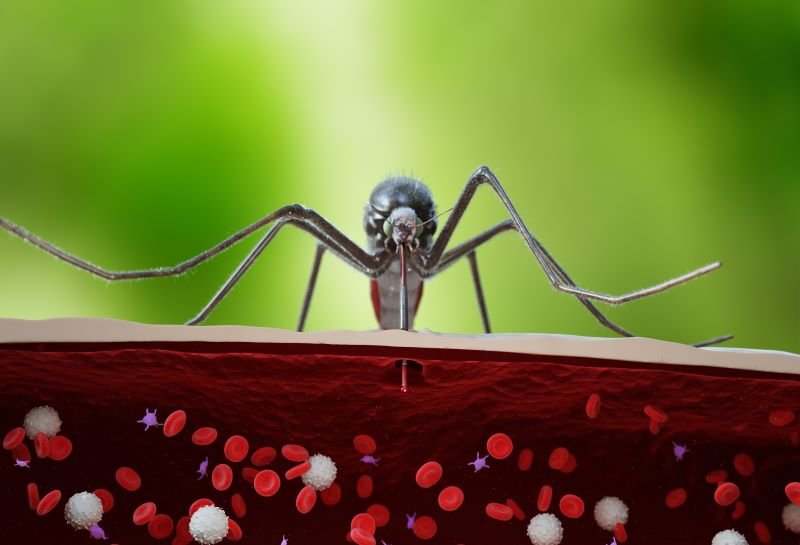Get Healthy!

- Steven Reinberg
- Posted October 19, 2023
Cache Valley Virus: Another Mosquito-Borne Illness Making Inroads in U.S.
A potentially deadly infection carried by mosquitoes may be more prevalent than once thought, U.S. health officials report.
Named the Cache Valley virus after the Utah area in which it was first found in 1956, it has caused seven serious infections nationwide. But it may have infected up to 18% of the population, according to an expert from the U.S. Centers for Disease Control and Prevention.
"We don't know much about it, there's only been seven documented cases," said CDC research microbiologist Amanda Calvert. Of these, three died and the others have had lasting effects, she said.
In all seven people, the virus caused a spinal cord infection called encephalitis or a brain infection called meningitis, Calvert said. All seven patients had conditions affecting their immune system, which seems to be why they developed a serious infection.
Calvert said the last known case was in a patient who got it from a transfusion of infected blood.
Most people who get the virus have mild symptoms or none at all, she said. Symptoms are non-specific and can include fever, headache, nausea, vomiting, fatigue and rash.
No specific treatment for the virus is known. Care consists of easing symptoms with painkillers.
Cache Valley virus is seen mostly in sheep. It causes stillbirths and birth defects in lambs. Whether the virus can cause human birth defects is unknown, Calvert said.
The virus isn't contagious, and can only be spread by the bite from an infected mosquito, she noted.
It's not even known which mosquitoes carry it.
To learn more about the virus, the CDC has developed a new test to quickly identify blood antibodies to it. The agency is now validating the test and hopes to have it available to state health departments in the near future, Calvert added.
The hope is the new test will allow broader surveillance to determine whether the recent infections are an indication of a growing threat.
The research was scheduled for presentation Thursday at the American Society of Tropical Medicine & Hygiene meeting, in Chicago. Study findings presented at medical meetings should be viewed as preliminary until published in a peer-reviewed journal.
"We don't know much about it," Calvert said. "So we don't know yet if it is a growing public health threat, but everyone should always be mindful to protect themselves and their loved ones from mosquito and tick bites."
She offered these tips:
"Before you go outside, make sure you put bug spray on," Calvert said. "Always wear loose-fitting clothing, and you can treat your clothes with permethrin as well to eliminate the bug bites."
She said people who are immunocompromised or are taking drugs that compromise their immune system should be particularly careful in the warmer months to protect themselves from mosquito and tick bites.
Dr. Bruce Farber, an infectious disease specialist at Northwell Health in Manhasset, N.Y., said Cache Valley virus doesn't appear to be a serious threat to most people.
"It illustrates one other thing which everyone knows now, which is more and more viruses are zoonotic, which means that whether it's COVID or whether it's this virus, or whether it's West Nile, or Eastern equine or Western equine or St. Louis virus, they all tend to have reservoirs in animals," he said. "Clearly, to me, the biggest threat, far and away would be avian influenza."
Farber said there are many more serious health risks than Cache Valley virus.
"There's so many landmines that we can step on, so from a practical point of view it's much more important to buckle your seatbelt and treat your hypertension," he advised.
He said many viruses circulating doctors don't even know about, which is why the "overwhelming majority" of cases of viral encephalitis have gone without a diagnosis. Farber said doctors should be aware of Cache Valley virus when they are facing an unexplained case of encephalitis.
More information
To learn more about Cache Valley virus, visit the U.S. Centers for Disease Control and Prevention.
SOURCES: Amanda Calvert, PhD, research microbiologist, U.S. Centers for Disease Control and Prevention, Fort Collins, Colo.; Bruce Farber, MD, infectious disease specialist, Northwell Health, Manhasset, N.Y.; presentation, American Society of Tropical Medicine & Hygiene meeting, Chicago, Oct. 19, 2023






